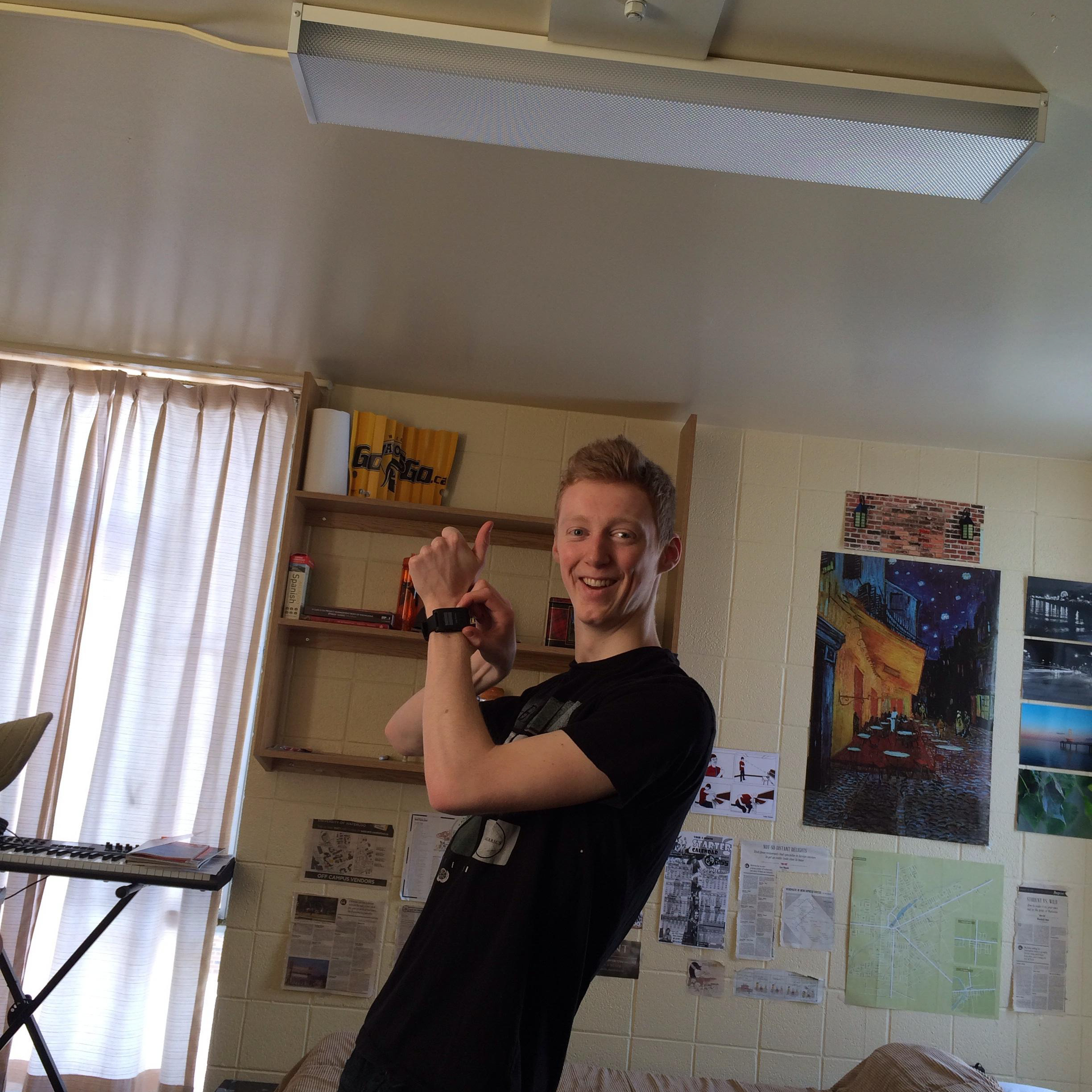If you'd like to know more about where this photo is from, please check out my friend Lauren's portfolio.
Working In Teams for the First Time: Four Tips to Help You Build Something Awesome
So, you're a student, a volunteer, new to the office or in another position that has you working as part of a team for the first time, what do you do? How can you help the project be a success? If you're in charge of the team, how can you keep morale up and produce the best product possible? Certainly, every team is different and every working environment unique, but over my few years of group work in university I have distilled a few guidelines that I think will help if you find yourself in this situation and are new to working on a team.
I should say two things before we dive in here, one, this is by no means a complete list, it's more of a 'tips I've learned so far' sort of list. I'm a huge ambassador of learning and working within teams which pushes me to constantly refining the way I work within groups; so full disclosure, if you ask me about these tips in a year or two I many have very different things to say. Secondly, you should know that this list could be totally inapplicable to you! I certainly hope it isn't, but as I said, I'm only in university. While I thank my program for giving me many opportunities to both lead and contribute to a variety of projects (such as building a video game, a site-specific art installation and marketing plan if you were curious for some examples) it hasn't given me experience in things like construction or electrical engineering, so I confess these tips may not work if those or other different fields work differently! That being said, I tried to make these tips as open as possible so hopefully whoever you are, be you in a galaxy far far away or our very own Milky Way, you will find these tips applicable in some way (that rhyme was totally coincidental I promise).
Tip 1: It's all About the People
While computers are fantastic tools to work on, the current state of technology and the status of artificial intelligence makes it difficult to work with computers. Due to this fact, you will most likely be working with other humans on your team. Now I'll admit, that was probably a given, but why does it matter who you work with? It matters because unlike computers (at the time of writing) people have emotions, feelings, pride for their work and a willingness to contribute that effort to a specific project. I've seen too many people on teams (both team leaders and members) that seem to forget they're working with people and treat their fellow group members like a computer where input deserves immediate, precise output when in reality this is rarely realistic and damages team morale. Additionally, I find that in more creative fields expecting precise results actually damages the final product the team is working towards. If one person dictates all the specifics of a project then you're ignoring the talents of all your team members. The beauty of group work is that together you are able to make something greater than the sum of what you could do as individuals, but this only happens if all members contribute and are not simply used as mindless processors (again processors may not be so mindless depending on when you read this).
So hopefully I've shown you why this is worth avoiding, but how you may ask, might you try and avoid this? As I said this isn't an exact science, but from my experience I can say that it's important to always be in tune with not only the work your group members are doing but also how they feel and how they are working on those deliverables. Remember that if someone needs assistance or direction on a task it is more effective to work with them to help them understand and get them on the right track. The more you simply dictate, enforce or demand tasks to be completed the less likely they are to be completed, and completed to the best of that person's ability (although I relent, under certain circumstances I'm sure a more abrasive approach is better suited to produce results). So I suppose my advice from all this is to simply be in tune with your group members and remember that you are dealing with people and not machines!
Tip 2: Communication is Everything
This is something I'm sure we've all been told before and are well away of; communication is important. This idea could be applied to everything from relationships to call center systems. To try and use one analogy, communicating in a group is like calling a help line, it's always easier to push zero and go straight to a representative than it is to try and talk to the machine who isn't really listening. Does that make sense at all? Let me try and explain a bit.
Communication is important. More specifically open, honest and voluntary communication is crucial when working in a group. By open communication I mean you have to be willing to talk with all members of your group about all aspects of your contribution. I find that a lot of trouble arises when one group member discusses important details of their progress to one other group member assuming that the message will be distilled from there onward to the relevant bodies. This is rarely the case. At the beginning of a project you should work hard to establish and/or familiarize yourself with the proper communication channels to ensure that all members of the group are up to date on the projects progress. If all group members are well informed then people are much more likely to have their deliverables done on time and the project, in my experience, flows much smoother. One additional thing to consider, if there is a piece of information you need to share that you know is definitely specific to only one other person within the team it is probably better to share that information with that one person. While open communication is good, if there are too many unnecessary messages shared with the entire group the members may stop paying attention which is bad communication! All I can say is use your best judgment and ask yourself if the group needs to be aware of an update, or only one specific people. To use the call center analogy, don't press zero to get right to the operator when pressing one will get you to the right person just fine. I think that analogy makes sense…
When I talk about honest communication I simply mean to just be honest! This may sound simple, but is actually something I suffer with myself. If you need to update your team on the progress of a deliverable or if they ask you how long something may take to complete it's extremely important to be as honest and straightforward with them as possible. While it may feel like you're letting the group down by not having things done sooner it's important to know that your well-intentioned fib could hurt the group later on. If you're honest and open with the group they can step in and assist for the good of the project; it's another of the amazing benefits of working on a team! So I encourage you to be honest and to help to foster a safe communication environment that encourages others to be honest as well. After all, if you hit four for billing because you think it will be faster than hitting five for customer support, nobody will be happy and you'll most likely be on hold much longer. Also to answer your question, yes I am sticking with this analogy useful or not.
Finally, voluntary communication. By this I mean you should be willing to volunteer information to the group about your progress or about any issues you are having. In a way, this is a combination of the previous two types of communication. To communicate you have to speak to the right people, be honest and actually communicate! What good speaking to the right to people honestly if you don't tell them! This could mean letting the group know you will be finished a task ahead or behind schedule (remember honesty now) or letting your group know something has changed with the deliverables. It helps the project flow much smoother if you volunteer information and actively inform your group members of your work so they are not hounding you down for answers. In short, before you pick the number to press on the helpline, you have to first pick up the phone.
Tip 3: Use the Group!
As I mentioned earlier, one of the best parts about working within a group is that you can collectively build something greater than the sum of your parts. To do this everyone in the group must be actively involved. From the leader's position, you have to encourage all the group members to speak freely and encourage their feedback on the project and key build decisions. From the member's position, you have to be willing to voice your opinions and ideas in a constructive way to help the project be all it can be. In short, you must make sure you are using the group to the fullest capacity.
Of course for various reasons, be they time, cost, scope etc. certain decisions must be made on an executive level without feedback from the full group. Likewise, when sharing ideas to the group make sure they are well conceived and relevant. While I love to incorporate adorable photos of puppies into everything I work on, I recognize those photos may not be overly applicable to a marking plan for a golf company. In general just use your best discretion as both a leader and a group member. Use the group to the fullest extent when you can, but remember there is a deadline, and the projects completion is the number one priority; use your time and group wisely.
Tip 4: Encourage Understanding
I considered rolling this point into the others but I thought it deserved a little extra attention (plus I've got no essays to write at the moment and I think I'm going through withdrawals). When working on a team, be that as a leader or member, remember that the project can only be successful if all group members are confident and understand their role within the project scope. To do this you must use all of the previous tips together to create good team morale and synergy. You must work with people and make sure they are comfortable in the working environment. You must communicate with them to ensure they are updated and aware of the tasks that need to be done. Finally, you must ask the group for ideas and feedback and be willing to offer feedback yourself. Hopefully mixing these ideas around with a little charisma helps the group bond and truly care about the work they are doing. If everyone cares for the project they will be more willing to work on it, take pride in it and contribute ideas to it. In my experience, having this understanding between group members and fostering this pride produces the best results.
Now, saying this tip isn't an ‘exact science’ would probably be an understatement. If anything it's an idealistic goal, at least for me. To me, creating that synergy within a group can make the group experience, prepare yourself for this, fun. Whatever the field, whatever the task, try to develop a goal for how you think a team should work. Think of teams you loved to be a part of and think of ones you’ve, let's say, less than loved. What was it that made those successful teams successful? Once you know what you like in a group you can work towards fostering that community in future groups you are a part of. It may be taboo to say but I promise, group work can be fun if you make it.
Conclusion
So I realize that I have rambled on here for probably too many words (I think you would be scared if I told you the actual number) so thank you for letting me indulge into a field I love. If you've made it this far I think you owe yourself some ice cream. Having to end though I want to leave you with two final thoughts. The first is to seriously question everything you've read. I want you to think about it, question it, doubt it, eat ice cream while thinking about it, agree with it, disagree with it and form your own opinion about it. Maybe these tips will be helpful for you and maybe they won't, but I hope they get you thinking. I encourage you to go forth into your future teams and learn for yourself what you love and don't love about working in groups. Find what makes them successful for you. My second tip is simply, don't be scared. Group work gets a lot of stigma (in University especially) but as I said it can be fun, rewarding and a chance to build incredible things. To use another terrible analogy, make teamwork like an Orange. Try it, get under the skin of it, find out if you like it better as a fruit or as a juiced version of that fruit. Do you like it with pulp or without? What makes that Orange great for you? Follow those guidelines and hopefully you will come to like group work (and Oranges) as much as I do!
- Calen Siddall





